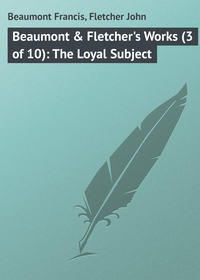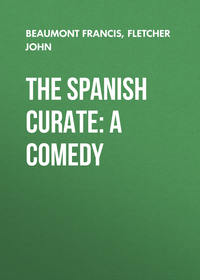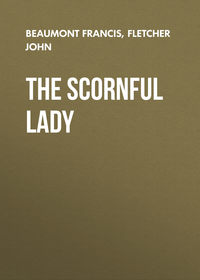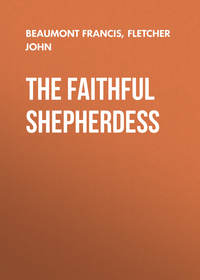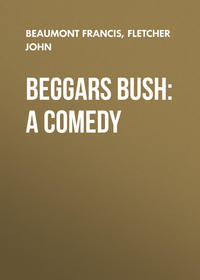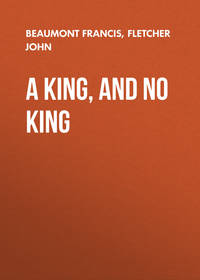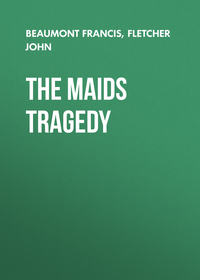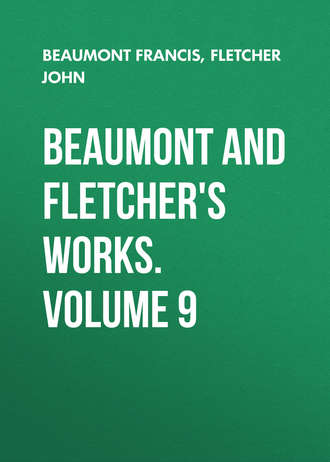
Beaumont and Fletcher's Works. Volume 9
The Epilogue at the reviving of this Play
We need not tell you Gallants, that this nightThe Wits have jumpt, or that the Scenes hit right'Twould be but labor lost for to excuseWhat Fletcher had to do in: his brisk MuseWas so Mercurial, that if he but writAn Act, or two, the whole Play rose up wit.We'll not appeal unto those GentlemenJudge by their Cloaths, if they sit right, nor whenThe Ladies smile, and with their Fanns delightTo whisk a clinch aside, then all goes right:'Twas well receiv'd before, and we dare say,You now are welcome to no vulgar Play.The Fair Maid of the Inn
Duke of Florence.
Cesario, a young Gentleman of a fiery nature, Son to Alberto,
Albertus, Father to Cesario, Admiral of Florence.
Baptista, a brave Sea-Commander, antient friend to Albertus, and Father to Mentivole and Biancha.
Mentivole, Son to Baptista, Lover of Clarissa.
Prospero, a noble friend to Baptista.
Two Magistrates of Florence.
Host, the supposed Father to Biancha.
Forobosco, a cheating Mountebank.
Clown, the Mountebanks man, and setter.
Three Gentlemen.
Secretary to the Duke.
Dancer,} Four fools and knaves,
Taylor,} who pretend love
Mulitteer,} Biancha, the Fair
Pedant,} Maid of the Inn.
Sailors.
WOMENMariana, Wife to Albertus, a virtuous Lady.
Clarissa, Mariana's Daughter, in love with Mentivole.
Juliana, Neece to the Duke of Genoa, Baptista's second wife.
Biancha, the Fair Maid of the Inn, beloved of Cesario, and Daughter to Baptista and Juliana.
Hostess, the supposed Mother of Biancha.
The Scene, FlorencePROLOGUE
Plays have their fates, not as in their true senceThey're understood, but as the influenceOf idle custom, madly works uponThe dross of many tongu'd opinion.A worthy story, howsoever writFor Language, modest Mirth, Conceit or Wit,Meets oftentimes with the sweet commendationOf hang't, 'tis scurvy, when for approbationA Jigg shall be clapt at, and every rhimePrais'd and applauded by a clamorous chime.Let ignorance and laughter dwell together,They are beneath the Muses pity. HitherCome nobler Judgements, and to those the strainOf our invention is not bent in vain,The Fair Maid of the Inn to you commendsHer hopes and welcomes, and withal intendsIn th' Entertains to which she doth invite ye,All things to please, a[n]d some things to delight ye.Actus Primus. Scæna Prima
Enter Cesario, and ClarissaCesario.Interpret not Clarissa, my true zealIn giving you counsel, to transcend the boundsThat should confine a brother; 'tis your honor,And peace of mind (which honor last will leave you)I labor to preserve, and though you yet arePure and untainted, and resolve to be so:Having a Fathers eye, and Mothers careIn all your ways to keep you fair, and upright.In which respects my best advices mustAppear superfluous; yet since love, dear SisterWill sometimes tender things unnecessary,Misconstrue not my purpose.Claris. Sir, I dare not:But still receive it as a large addition,To the much that I already stand ingag'd for,Yet pardon me, though I profess uponA true examination of my self,Even to my private thoughts I cannot find(Having such strong supporters to uphold me)On what slight ground the least doubt can be rais'dTo render me suspected, I can fall,Or from my Fame or Virtue.Cæsar. Far be it from me,To nourish such a thought; and yet excuse me,As you would do a Lapidary, whose whole fortunesDepend upon the safety of one Jewel,If he think no case precious enoughTo keep it in full lustre, nor no locks,Though lending strength to Iron doors sufficientTo guard it, and secure him; you to me areA Gemm of more esteem, and priz'd higherThan Usurers do their Muck, or great men Title.And any flaw (which heaven avert) in you,(Whose reputation like a DiamondCut newly from the rock, women with envie,And men with covetous desires look up at)By prying eies discovered in a momentWould render what the braveries of FlorenceFor want of counterpoize, forbear to cheapen,Of little or no value.Claris. I see brotherThe mark you shoot at, and much thank your love;But for my Virgin Jewel which is broughtIn comparison with your Diamond, rest assur'dIt shall not fall in such a workmans handsWhose ignorance or malice shall have powerTo cast one cloud upon it, but still keepHer native splendor.Cesa. 'Tis well, I commend you;And study your advancement with that careAs I would do a Sisters, whom I loveWith more than common order.Claris. That from me,I hope's return'd to you.Cesar. I do confess it,Yet let me tell you, (but still with that love,I wish to increase between us) that you areObserv'd against the gravity long maintain'dIn Italy (where to see a maid unmasqu'dIs [h]eld a blemish) to be over-frequentIn giving or receiving visits.Clari. How?Cesar. Whereas the custom is here to wooe by Picture,And never see the substance: you are fair,And beauty draws temptations on; You know it,I would not live to see a willing grantFrom you, to one unworthy of your birth,Feature or fortune; yet there have been LadiesOf rank, proportion, and of means beyond you,That have prov'd this no miracle.Claris. One unworthy?Why, pray you gentle brother, who are theyThat I vouchsafe these bounties to? I hopeIn your strict Criticisme of me, and my manners,That you will not deny they are your equals.Cesar. Angry?Claris. I have reason, but in cold blood tell me,Had we not one Father?Cesar. Yes, and Mother too.Claris. And he a Soldier.Cesar. True.Claris. If I then borrowA little of the boldness of his temper,Imparting it to such as may deserve it;(However indulgent to your selves, you brothersAllow no part of freedom to your Sisters)I hope 'twill not pass for a crime in me,To grant access and speech to noble suitors;And you escape for innocent, that descendTo a thing so far beneath you. Are you touch'd?Why did you think that you had Giges Ring,Or the Herb that gives invisibility?Or that Biancha's name had ne'er been mention'd;The fair Maid of the grand Osteria, brother.Cesar. No more.Claris. A little, brother. Your night walks,And offer'd presents; which coy she, contemn'd,Your combats in disguises with your Rivals,Brave Muletiers. Scullions perfum'd with grease,And such as [cry] meat for Cats must be remembred;And all this pother for a common trull,A tempting sign, and curiously set forth,To draw in riotous guests, a thing expos'dTo every Ruffians rude assault; and subjectFor a poor salary, to a rich mans lust,Though made up of diseases.Cesar. Will you end yet?Claris. And this a Mistriss for Albertus Son,One that I should call Sister?Cesar. Part not withYour modesty in this violent heat; the truth is,(For you shall be my Confessor) I love her,But virtuously; report that gives her outOnly for fair, and adds not she is chaste,Detracts much from her: for indeed she is,Though of a low condition; compos'dOf all those graces, dames of highest birth,Though rich in natures bounties, should be proud of;But leave her, and to you my nearest care,My dearest best Clarissa. Do not think(For then you wrong me) I wish you should liveA barren Virgin life; I rather aim atA noble Husband, that may make you motherOf many children, one that when I know himWorth your embraces, I may serve, and sue [to]:And therefore scorn not to acquaint me withThat man, that happy man; you please to favour.Claris. I ever purpos'd it, for I will likeWith your allowance:Cesa. As a pawn of this;Receive this Ring, but e'r you part with itOn any terms, be certain of your choice;And make it known to me. Enter Servants with Lights, Alberto, Baptista, Mariana, MentivoleClaris. You have my hand for't.Cesar. Which were it not my Sisters, I should kiss:With too much heat.Claris. My Father and his guests, Sir.Alber. Oh my old friend, my tri'd friend, my Baptista:These days of rest and feasting, sute not withOur tougher natures, those were golden ones,Which were enjoy'd at Sea; that's our true Mother:The Land's to us a step-dame; there we soughtHonor, and wealth through dangers: yet those dangersDelighted more than their rewards, though great ones,And worth the undertakers: here we studyThe Kitchin Arts, to sharpen appetite,Dull'd with abundance; and dispute with Heaven;If that the least puff of the rough North-wind,Blast our times burthen, rendring to our PalatsThe charming juice less pleasing; whereas thereIf we had Bisket, powder'd flesh, fresh water,We thought them Persian delicates, and for MusickIf a strong gale but made the main yard crack,We danc'd to the loud Minstrel.Bapt. And fear'd less,(So far we were in love with noble action)A tempest than a calm.Alber. 'Tis true Baptista;There, there, from mutual aids lent to each other,And virtuous emulation to exceedIn manly daring, the true School of friendship,We learnt those principles, which confirm'd us friendsNever to be forgot.Baptist. Never I hope.Alber. We were married there, for bells the roaring Canon,Aloud proclaim'd it lawful, and a prizeThen newly ta'en, and equally divided,Serv'd as a dowry to you, then stil'd my wife;And did enable me to be a Husband,Fit to encounter so much wealth, though gotWith bloud and horror.Maria. If so got, 'tis fit SirNow you possess it, that you should enjoy itIn peace, and quiet; I, your Son, and DaughterThat reap the harvest of your winters labour,Though debtors for it yet have often trembled,When, in way of discourse, you have relatedHow you came by it.Alber. Trembled? how the softnessOf your sex may excuse you, I'll not argue,But to the world, howe'er I hold thee nobleI should proclaim this boy some cowards bastard,And not the Image of Albertus youth:If when some wish'd occasion calls him forth,To a brave trial, one weak arteryOf his, should show a fever, though grim deathPut on a thousand dreadful shapes to fright him;The Elements, the Sea, and all the WindsWe number on our compass, then conspiringTo make the Scæne more ghastly; I must have theeSirrah, I must, If once you grapple withAn enemies ship, to board her, though you seeThe desperate Gunner ready to give fire,And blow the deck up, or like Cæsar's SoldierThy hands like his cut off, hang by the teeth,And die undaunted.Maria. I even die to hear you:My son, my lov'd Cesario run such hazards?Bless'd Saints forbid it: you have done enoughAlready for one family, that rude way;I'll keep him safe at home, and train him upA compleat Courtier: may I live to see him,By sweet discourse, and gracious demeanor,Winn, and bring home a fair Wife, and a rich;'Tis all I rest ambitious of.Alber. A Wife!As if there were a course to purchase onePrevailing more than honourable action!Or any Intercessors move so far,To take a Mistriss of a noble spirit,As the true fame of glorious victories,Atchiev'd by sweat and bloud! Oh the brave damesOf warlike Genoua! they had eyes to seeThe inward man, and only from his worth,Courage, and conquests: the blind Archer knewTo head his shafts, or light his quenched Torch,They were proof against them else.No Carpet KnightThat spent his youth in Groves, or pleasant Bowers;Or stretching on a Couch his lazy limbs,Sung to his Lute such soft and melting Notes,As Ovid, nor Anacreon ever knew,Could work on them, nor once bewitch'd their sense;Though he came so perfum'd as he had robb'dSabæa, or Arabia, of their wealth;And stor'd it in one sute:I still remember,And still remember it with joy, Baptista,When from the rescue of the Genoua Fleet,Almost surpriz'd by the Venetian Gallies,Thou didst return, and wert receiv'd in triumph.How lovely in thy honor'd wounds and scarsThou didst appear! what worlds of amorous glancesThe beauties of the City (where they stood,Fix'd like so many of the fairest stars)Shot from their windows at thee! how it fir'dTheir blouds to see the enemies captive streamsBorn through the streets! nor could chaste JulianaThe Duke's fair Neece, though guarded with her greatnessResist this gallant charge, but laying byDesparity of fortune from the object,Yielded her self thy prisoner.Bap. Pray you chuse some other theme.Mari. Can there be one more pleasing?Bap. That triumph drew on me a greater torture,And 'tis in the remembrance little lessThan ever Captive suffer'd.Mari. How? to gain the favour of so great a Lady?Bap. Yes, since it prov'd fatal, t'have been happy, Madam,Adds to calamity, and the heavy lossOf her I durst not hope for, once enjoy'd,Turns what you think a blessing to a curse,Which grief would have forgotten.Alber. I am sorry I touch'd upon it.Maria. I burn rather, Sir,With a desire to hear the story ofYour loves, and shall receive it as a favour,Which you may grant.Bap. You must not be deny'd,Yet with all brevity I must report it;'Tis true, fair Juliana (Genoua's pride)Enamour'd of my actions, lik'd my person;Nor could I but with joy meet her affection;Since it was lawful, for my first wife dead;We were closely married, and for some few monthsTasted the fruits of't; but malicious fate,Envying our too much happiness, wrought uponA faithless servant, privy to our plot,And Cabinet-Counselor to Juliana,Who either for hope, or reward, or fear,Discover'd us to the incensed Duke:Whose rage made her close prisoner, and pronounc'dOn me perpetual banishment: some three yearsI wander'd on the Seas, since entertain'dBy the great Duke of Florence; but what fateAttended her? or Prospero my friend,That staid at Genoua, to expect the issue,Is yet uncertain.Enter a GentlemanAlber. From the Duke:Bap. He's welcome, to end my forc'd relation.Alber. Signior Baptista;The Great Dukes Will commands your present [e]are.Gent. It points indeed at both of you.Bap. I wait it.Alber. In Mariana, to your rest.Bap. Nay leave us, we must be private.Maria. Stay not long Cesario:[ —Exeunt Manet Cesario, Mentivole.Mentivo. So these old men vanish'd, 'tis allow'dThat we may speak, and howsoe'r they takeDelight in the discourse of former dangers,It cannot hinder us to treat a littleOf present pleasures.Cesario. Which if well injoy'd,Will not alone continue, but increaseIn us their friendship.Ment. How shall we spend the night?To snore it out like drunken Dutchmen, wouldSort ill with us Italians. We are madeOf other metall, fiery, quick, and active;Shall we take our fortune? and while our cold fathers(In whom long since their youthful heats were dead,)Talk much of Mars, serve under Venus Ensigns,And seek a Mistriss.Cesar. That's a game dear friend,That does admit no rival in chase of it.And either to be undertook alone,Or not to be attempted.Ment. I'll not press you;What other sports to entertain the time withThe following morning?Cesar. Any that may become us.Ment. Is the Neapolitan horse the Viceroy sent you,In a fit plight to run?Cesar. So my Groom tells me.I can boast little of my horsemanship;Yet upon his assurance, I dare wagerA thousand Crowns, 'gainst any horse in Florence,For an eight mile course.Ment. I would not win of you,In respect you are impatient of loss:Else I durst match him with my BarbaryFor twice the sum.Cesar. You do well to excuse it, being certain to be beaten.Ment. Tush. You know the contrary.Cesar. To end the controversiePut it to trial, by my life I'll meet you Enter ClarissaWith the next rising Sun.Ment. A match. But hereAppears a Cynthia, that scorns to borrowA beam of light from the great eye of Heaven,She being her self all brightness; how I envyThose amorous smiles, those kisses, but sure chaste onesWhich she vouchsafes her brother!Claris. You are wanton:Pray you think me not Biancha, leave I pray you;My Mother will not sleep before she see you,And since you know her tenderness, nay fondness;In every circumstance that concerns your safety,You are not equal to her.Cesar. I must leave you; but will not fail to meet you.Ment. Soft sleeps to you.Within. Mariana: Cesario.Claris. You are call'd again.Cesar. Some SonsComplain of too much rigor in their Mothers;I of too much indulgence; you will follow. —[Exit.Claris. You are her first care, therefore lead the way.Ment. She staies: blest opportunity, she staies:As she invited conference, she was everNoble, and free: but thus to tempt my frailty,Argues a yielding in her; or contemptOf all that I dare offer; stand I nowConsulting? No, I'll put it home.Claris. Who waits there? more Lights.Ment. You need them not, they are as useless,As at noon-day; can there be darkness, whereNature then wisely liberal, vouchsaf'dTo lend two Suns.Claris. Hyperboles:Ment. No, truths:Truths beauteous Virgin, so my love-sick heartAssures me, and my understanding tells meI must approach them wisely, should I rashlyPress near their scorching beams, they would consume meAnd on the contrary, should your disdainKeep me at too much distance, and I wantTheir comfortable heat, the frost of deathWould seize on all my faculties.Cla. Pray you pause, Sir.This vehemency of discourse must else needs tire you.These gay words take not me, 'tis simple faithHonest integrity, and lawful flamesI am delighted with:Ment. Such I bring with me, and therefore Lady.Cla. But that you took me offE're I came to a period; I had addedA long experience must be requir'dBoth of his faith and trust, with whom a VirginTrafficks for, what's dearest in this life,Her liberty, and honor; I confessI oft have view'd you with an eye of favour,And with your generous parts the many tendersOf doing me all fair offices, have wonA good opinion from me.Ment. Oh speak ever, I never heard such Musick.Cla. A plain tune, Sir:But 'tis a hearty one; when I perceiveBy evident proofs, your aims are truly noble,And that you bring the Engines of fair Love,Not of foul Lust, to shake and undermineMy Maiden-fortress: I may then make goodWhat now I dare not promise.Ment. You alreadyIn taking notice of my poor deservings,Have been magnificent, and 'twill appearA frontless impudence to ask beyond thisYet qualifie, though not excuse my error,Though now I am ambitious to desireA confirmation of it.Cla. So it wrong not my modesty to grant it.Ment. 'Tis far from me,I only am a suitor, you would grace meWith some toy, but made rich in that you wore it,To warrant to the world that I usurp notWhen I presume to stile my self your servant,A ribond from your shooe:Cla. You are too humble,I'll think upon't; and something of more valueShall witness how I prize you, it grows late,I'll bring you to the door.Ment. You still more bind me. —[Exeunt. Enter Duke of Florence, Alberto, Baptista, Magistrates, and AttendantsDuke. You find by this assur'd intelligenceThe preparation of the Turk[e] against us.We have met him oft and beat him; now to fear himWould argue want of courage, and I hold itA safer policie for us and our signioriesTo charge him in his passage o'er the Sea,Than to expect him here.Alb. May it please your HighnessSince you vouchsafe to think me worthy ofThis great imployment, if I may deliverMy judgement freely, 'tis not flatteryThough I say my opinion waits on you,Nor would I give my suffrage and consentTo what you have propos'd, but that I know itWorth the great speaker, though that the denialCall'd on your heavy anger. For my selfI do profess thus much, if a blunt Soldier,May borrow so much from the oyl'd tongu'd Courtier,(That ecchoes whatsoe'er the Prince allows of)All that my long experience hath taught meThat have spent three parts of my life at Sea,(Let it not taste of arrogance that I say it)Could not have added reasons of more weightTo fortifie your affections, than suchAs your grace out of observation meerlyAlready have propounded.Bap. With the honor to give the daring enemy an affrontIn being the first opposer it will teachYour Soldiers boldness: and strike fear in themThat durst attempt you.1 Magi. Victuals and Ammunition,And Money too, the sinews of the War, are stor'd up in theMagazine.2 Magi. And the Gallies new rig'd and train'd up,And at two dayes warning fit for the service.Duke. We commend your care,Nor will we e'er be wanting in Our counsels,As we doubt not your action; you BaptistaShall stay with us; that Merchant is not wise,That ventures his whole fortunes in one bottom.Albert. Be our Admiral, spare your thanks,'Tis Merit in you that invites this honor,Preserve it such; ere long you shall hear more,Things rashly undertaken end as ill,But great acts thrive when reason guides the will.– Exeunt. Enter 3 Gentlemen1. No question 'twas not well done in Cæsario,To cross the horse of young MentivoleIn the midst of this course.2. That was not all, the switching him dull'd him.3. Would that both the jadesHad broke their necks, when they first started; 'Slight,We stand here prating, give them leave to whisper,And when they have cut one anothers throats Enter Mentivole, and CæsarioMake in to part 'em.2. There is no such hazard,Their Fathers friendship, and their love forbid it;See where they come!1. With fury in their looks.Ment. You have the wager, with what foul play gotI'll not dispute:Cæsar. Foul play?Ment. I cannot speak itIn a fairer language, and if some respectsFamiliar to my self chain'd not my tongue,I should say no more. I should, but I'll sit down,With this disgrace; how e'er press me no farther.For if once more provok'd, you'll understandI dare no more suffer an Injury,Than I dare do one.Cæsar. Why Sir are you injur'dIn that I take my right which I would force,Should you detain it?Ment. Put it to judgment.Cæsar. No; my will in this shall carry it.Ment. Your will? nay, farewell softness then.[They suddenly draw3. This I foresaw.2. Hold, hold.Cæsar. I am hurt.2. Shift for your self, 'tis death.Men. As you respect me, bear him off with care,If he miscarry since he did the wrong,I'll stand the shock of't.2. Gently, he will faint else. —[Exeunt Gent. with Cæsario.Ment. And speedily, I beseech you; my rage over,That pour'd upon my reason clouds of error,I see my folly, and at what dear lossI have exchang'd a real innocence,To gain a meer fantastical report,Transported only by vain popular wind,To be a daring, nay, fool-hardy Man. Enter BaptistaBut could I satisfie my self within here,How should I bear my fathers frown? They meet me,My guilt conjures him hither.Bap. Sirrah:Mentiv. Sir:Bap. I have met the trophies of your ruffian sword:Was there no other Anvile to make triallHow far thou durst be wicked, but the bosomeOf him, which under the adulterate nameOf friendship, thou hast murder'd.Ment. Murder'd Sir?My dreams abhor so base a fact; true valourImploy'd to keep my reputation fairFrom the austerest Judge, can never meritTo be branded with that title; you begot meA man, no coward; and but call your youthTo memory, when injur'd, you could neverBoast of the Asses fortitude, slave-like patience:And you might justly doubt I were your son,If I should entertain it; if CæsarioRecover, as I hope his wound's not mortal,A second tryal of what I dare doeIn a just cause, shall give strong witness for meI am the true heir to Baptista's courage,As to his other fortunes.Baptist. Boy, to neither:But on this strict condition, which intreatiesFrom Saints, nay Angels, shall not make me alter.A friendship so began, and so continu'dBetween me and Alberto my best friend,Your brawls shall not dissolve; it is my will,And as I am thy Father, I command thee,That instantly, on any termes, how poorSo e'er, it skills not, thou desire his pardon,And bring assurance to me, he has sign'd it,Or by my Fathers soul I'll never know thee:But as a stranger to my blood; perform it,And suddenly, without reply, I have said it.Ment. And in it given a heavier sentence on meThan the most cruel death; you are my fatherAnd your will to be serv'd, and not disputedBy me, that am your Son: But I'll obey,And though my heart-strings crack for't, make it known,When you command, my faculties are your own.[Exeunt.

